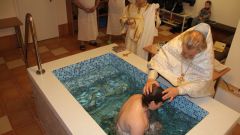Instruction
1
Select a convenient time. It is unacceptable to distract the priest while making Sacraments. It is best to approach the priest after the service. First you need to ask the father's blessings. Fold the arms in cross: right on left, palms up. Having received the blessing, kiss the priest's hand. It is not only a sign of reverence to the person wearing the priestly dignity, but most importantly - acceptance of the blessing of The Lord. Then you can ask a question.
2
There is nothing wrong if you don't know how to behave in a particular case (how to ask for blessings, how to put a candle, how to venerate the icons, etc.). If you find it hard to commit some kind of ritual (for example, to ask the blessing), don't force yourself. Your faith must be free and voluntary, and the performance of rites - conscious. The priest will be friendly to you in any way, even if your experience of Church life is very small.
3
In many parishes there is a designated time for conversation with parishioners. This is the most suitable option in order to ask a question, it is possible to be sure that the priest has time for you. If such conversation in the temple is not carried out, simply ask the priest when he can fit you in.
4
Many people ask questions to the priest during his own confession. It is quite acceptable, but only need to remember that you should not too long delay the priest, surely he will confess and other parishioners, and it takes a lot of time. Besides, confession is a sacrament that requires a serious attitude of prayer and a deep desire to be cleansed from sin. If you still want to ask your question during confession, consider whether it is appropriate.
5
Now widely practiced fellowship with the priests via the Internet. On various websites, forums, social networks have the opportunity to ask a particular priest. This is often done anonymously, which, of course, very convenient. But we must remember that not all the questions the priest is able to meet virtually. He can only give General advice or direct your thoughts in a certain direction. But relying on such virtual communication is not necessary, as only in a personal conversation the priest will be able to delve deeply into your situation.
Note
Do not despair if the answer to the question you are not satisfied or even upset. It can be good for you, because then you will be able to take a fresh look at the situation, and perhaps understand their own mistakes. No matter how developed your communication with the priest, try to find an answer to your question within the Church. Read books, articles on Orthodox sites, chat with believers, and God will reveal to you how to do in a given situation.
Useful advice
To find his spiritual father - a task very difficult. Even those who a few years regularly goes to Church, very often there is no Confessor. But we should strive to do, because the priest who knows your spiritual life can help you in different situations.






